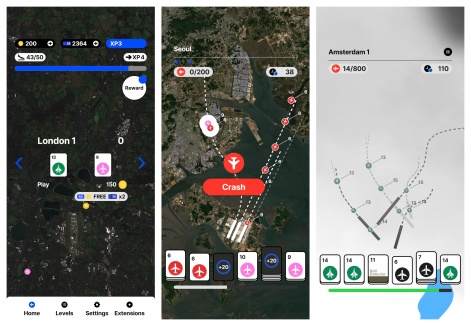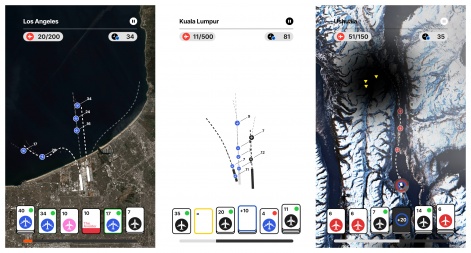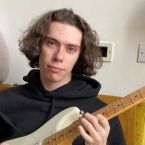No matter the size of the game or how long it ultimately takes to make, each new title involves a lot of hard work, tough decisions, and a little bit of luck before it even gets out the door and onto devices.
And that's only the first step to making the title succeed.
To highlight the extensive work that goes unseen in the background, PocketGamer.biz is reaching out to developers to learn more about the process of releasing a video game, with our 'Making Of' series.
This week, we spoke with solo indie developer Vincent Borcard about the journey of writing his first line of code to releasing a finished product.
Borcard single-handedly developed the upcoming Airport Radar, which sees players take the roll of an air traffic controller across the world's various airports.
PocketGamer.biz: Where did the initial idea for Airport Radar come from?
Vincent Borcard: I don't come from the video game world at all. I have a PhD in art history, I teach, and I was in charge of an institution with the largest collection of synthesizers in the world.
It all started from a desire to learn: to learn to code, to learn to design a game, to learn to distribute it. The theme and the genre came later.
The game spawned from a visual - an aeroplane in a circle - which is also the current icon of the game. I asked myself what I could do with this plane.
I first coded a kind of Match-3 with an alternative game mechanic. You had to match planes to make them land. The code was horrible (I still don't know how it could work) and the game was not very fun. I decided to start over. I just kept the icon and started building what is now Airport Radar.
How long did development take, and how many people worked on the game?
If I had to start again now, this game could be done much fasterVincent Borcard
The development took three years, and I did it alone. It took a long time because I started from scratch. At the beginning, I didn't know how to code a single line. Plus, I did it at night and on weekends. If I had to start again now, this game could be done much faster. In the end I asked someone to do the sound design and I could concentrate on the music.
What was the biggest challenge or setback you had to overcome during development?
The playtests. I've done a lot of playtesting myself and after a while you just want to play something else. The other problem with playtesting is that no matter how average a player you are (I'm talking about me), after a while you get good at it and the way you set up the game just becomes impossible for a newbie.
I got user statistics about successful levels, failed levels, scores and since version 1.0.0, the different updates are mainly to decrease the difficulty. Before that, a player tried to complete the same level 70 times - I don't want to be a sadist - games should be fun and error possible.

At what stage in development did you feel you had a game that you were happy with?
When I switched to the current gameplay, I immediately felt that there was potential. I can say that the prototype was done in one week and all the rest of the time was just adjustments. But basically, I see a lot of imperfections. What makes me happy is to think that I can improve for the next game.
What did you learn from soft launch and what were the biggest changes you enacted as a result?
The soft launch didn't really provide any insights, because without an advertising budget or an established fan base, it's hard to reach people and get enough downloads to draw conclusions from the data. We could have done without it.
What makes me happy is to think that I can improve for the next gameVincent Borcard
How happy are you with the game's launch so far?
I'm already happy that the game is working well. Apart from some minor bugs, the player experience is good. The feedback is good too, but I really hope this game will have more visibility because I think it deserves to be tried. It's hard to bring the message that a game exists to users.
On iOS, Apple can really put a game in the spotlight through its editorial content on the App Store. I really hope this happens because if it doesn't, it's almost impossible to turn red numbers black. But if that doesn't work, it's also okay. Because from the start, I saw this game as a business card: a digital artifact that says, 'I can do this'.
My real ambitions are for the next game, which will be developed with more resources, for which I will work with investors, which will offer a complete, exciting and radical experiences.

How are you approaching live ops? What can you tell us about your plans in terms of updates?
I have a lot of ideas to develop the game: new modes, added airports, and more. But these developments will really depend on the commercial success of the game. If the game is not profitable, I'd rather go straight to the next one.
What can you tell us about your future mobile projects?
I love mobile games; the touch surface allows for simple and intuitive experiences. So, I'm not going to give up on the mobile market. The next project will be cross-platform (mobile and PC). I don't want to reveal everything yet, but it will be a simulation in an unexpected genre. I'm really excited to develop and show this next project to the world.





















